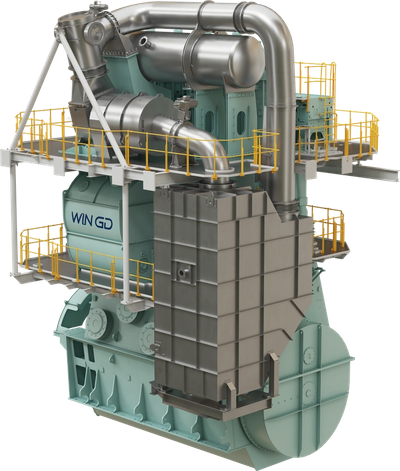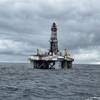WinGD Debuts Compact On-engine Emissions Solution for X-DF Portfolio
Swiss marine power company WinGD has introduced an on-engine version of its iCER system, enabling the emissions reduction technology to be installed without impact on engine footprint.
iCER is the first X-DF2.0 technology introduced to further boost the emissions performance and efficiency of the dual-fuel X-DF two-stroke engine series. X-DF engines running on LNG already offer a more than 20% reduction in greenhouse gas emissions and a reduction in air pollution compared to fuel oil. The addition of iCER delivers a 50% reduction of methane slip in gas mode. Combined with better fuel efficiency, this reduces total greenhouse gas emissions by up to 8% in gas mode. Running on diesel, iCER improves the emissions performance of X-DF engines by 6%.
The on-engine iCER offers the same advantages while simplifying testing, building and installation of the engine, as well as reducing the engine room space needed for emissions reduction equipment. The exhaust gas cooler and all exhaust gas flow control components are installed on the engine, offering significant engine room design flexibility.
Dr. Rudolf Holtbecker, Executive Director of Operations, WinGD, said, “The iCER technology is a vital component of our proven X-DF engine portfolio that has a clear role in supporting the marine industry’s transition to cleaner, greener fuels and reducing the carbon footprint of a vessel. This important addition to the choices in our X-DF2.0 portfolio extends the benefits to all shipyards and global engine builders with an improved arrangement and a production-friendly design for minimized manufacturing and installation costs.”
On-engine iCER is initially available on WinGD’s X72DF engines. Minimizing methane slip on LNG carriers has an added benefit for operators using their cargo as fuel, allowing them to maximize the value of the LNG delivered. The technology will be rolled out to other models in the X-DF engine range.
The principle behind iCER, which stands for intelligent control by exhaust recycling, is to minimize emissions by regulating air and exhaust gas flow. By cooling and recirculating exhaust back to the engine, more gases which can contribute to climate change are combusted without escaping into the atmosphere.
As well as reducing methane slip and total greenhouse gas emissions, both on- and off-engine iCER enable compliance with IMO’s Tier III NOx limits, whether using LNG or diesel fuels.












